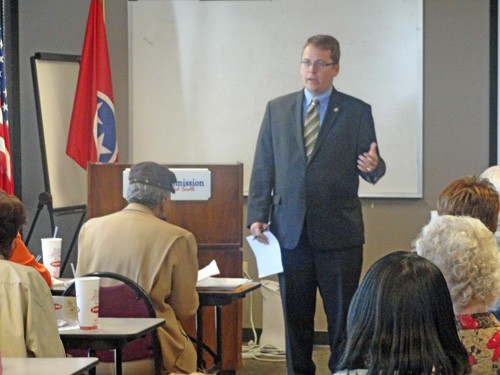As the video clip above — from a public-information session on the new state Photo-ID law, held at the Vasco A. Smith County Administration Building on Tuesday night — makes clear, public response has been relatively meager to state government’s current campaign to publicize the ins and outs of the law, which goes into effect on January 1st.
Officials of the Shelby County Electon Commission and the state Department of Safety were on hand for Tuesday night’s session, which also featured a prefabricated video of state Election Coordinator Mark Goins. The video recapped information that Goins had imparted at greater length during two live appearances in Memphis last week concerning the law passed by the 2011 General Assembly and binding on all Tennessee elections as of the New Year.
During his two live appearances here last Wednesday — at the offices of the Commission for the Aging on Poplar and at the Board of Education on Avery — Goins, who stressed that he had no part in making the law, made the point that, in essence, it replaced a requirement that voters show state or federal identification containing a legitimate signature with a requirement for a state or federal ID containing a bona fide photo.
The bill’s Republican sponsors have touted it as a way of guarding against election fraud; the bill’s detractors, including members of the legislature’s Democratic leadership, see it as a means of suppressing voter turnout, especially among college students, whose IDs are not regarded as acceptable, and seniors, whose reduced mobility could make their acquisition of an appropriate Photo-ID difficult.
In Memphis, Goins made an effort to allay concerns about the bill, pointing out that the law permits exemptions — e.g., for absentee voters, for residents of nursing homes or assisted-living centers, for voters with religious objections to being photographed — and that indigent voters and driver’s-license holders over 60 without Photo-IDs could receive “express service” upgrades at driver’s license centers.
(State Safety and Homeland Security Commissioner Bill Gibbons recently announced an agreement with 30 county clerks in Tennessee, including Shelby County Clerk Wayne Mashburn, to provide free of charge upgraded drivers’ licenses with photos to drivers who possess drivers’ licenses without photos.)
Goins also noted that voters without Photo-IDs could cast provisional ballots on election day that would be counted if they could furnish legitimate Photo-IDs within two days of the election.
At neither of his appearances last week was Goins pressed especially hard by opponents of the Photo-ID measure, but that honeymoon is destined to end, as state Democratic Party chairman Chip Forrester announced on Monday the beginning of a statewide voter-education program on the matter under party auspices.
Among other differences of opinion, Forrester contends that some 675,000 Tennessee voters now find their previously valid credentials to vote under challenge, as against the 126,000 currently invalid driver’s licenses cited by Goins.

- JB
- Goins in Memphis last week